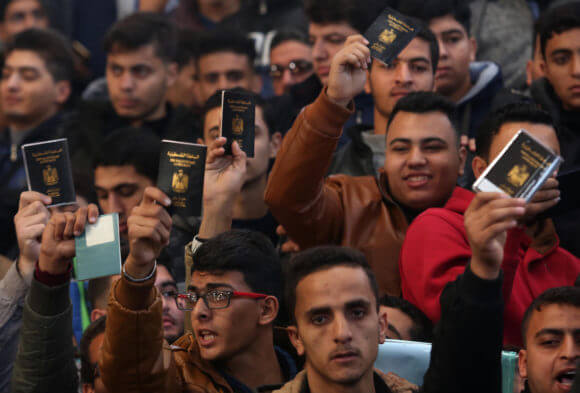This report is by a writer from WeAreNotNumbers.org in Gaza.
For over a decade Israel and Egypt prevented Palestinians from exiting Gaza by tightly controlling crossings that lead outside of the besieged strip. Palestinians now say that another block they face in traveling abroad is from the Palestinian Authority who have used a quiet policy to deny travel documents over the last decade.
In the past, Hamas’s ministry of interior had oversight on passport requests and used that authority to purge passport requests from political opponents. Presently the Palestinian Authority, or PA, is the only authority that can issue this vital document for Palestinians–including those in Gaza.
According to human rights monitors and sources who spoke to Mondoweiss, when passport requests are denied, Palestinians are told it is for “security reasons.” This block was traced back to interference by the Palestinian Intelligence Service in the West Bank.
Bakr al-Turkmani from the Gaza office of the International Commission for Human Rights (ICHR), a quasi-governmental human rights monitor, said his group has monitored passport denials since 2007.
According to al-Turkmani, most requests for passports that are ignored or refused are seemingly tied to a perceived connection with political factions. It is not necessary that the person has a direct connection, but a relationship of a first-degree family member is often noticed. For these reasons, Palestinians regard passport denials made in this fashion as a form of collective punishment.
“The refusal is due to political issues, like being affiliated with any parties opposing the PA,” al-Turkmani surmised. “Like there are women, daughters, sons, relatives or friends for whom the PA refuses to issue passports just because someone close to them has a connection with an opposing party.”
ICHR told Mondoweiss that from 2007 to 2016, it recorded 90 complaints from Palestinians in Gaza regarding passport requests that were refused or ignored. Since 2017, 50 more complaints have been received.
“One complaint is the same as 100 to us,” al-Turkmani said. “The PA is violating Palestinian law, which grants all Palestinians the right to move freely.”
The Palestinian government began issuing passports in 1995 following the signing of the Oslo Accords. Initially, blank passports were green and printed in Gaza. Today they are black and printed in France. While they say the word “passport” they are not issued by any state and are laissez-passers issued by the PA. Palestinians who are in the population registry, which is a list Israel has final approval over, are eligible to apply for the document.
In the 2003 Amended Palestinian Basic Law, Article 20 states, “Freedom of residence and movement shall be guaranteed within the limits of the law,” which is interpreted to mean every Palestinian is guaranteed a right to a passport. Article 11 further states that “It is unlawful to arrest, search, imprison, restrict the freedom, or prevent the movement of any person, except by judicial order in accordance with the provisions of the law.”
In 2007 the Palestinian government split in two after Hamas won elections in Gaza in 2006, leaving Hamas governing Gaza and the Palestinian Authority represented by Fatah governing the West Bank. The dispute was violent and bitter. Leading up to 2007 the Palestinian population registry was in Gaza and Palestinians could locally apply for travel documents. But that year the registry and passport oversight was moved to the West Bank. Palestinians in Gaza use travel agencies to transport their document requests to Ramallah. The Norwegian Council of Refugees reports that the fees for using travel agencies run between 300 and 1000 NIS.
Gaza has reported shortages of tens of thousands of passports shortly after the government split. “Unfortunately, what is going on is a consequence of the current division between the Palestinians, and the Palestinian citizen seems to be the victim,” Ihab al-Ghussein, a spokesperson for the interior ministry in Gaza, told the Electronic Intifada in 2010. “Most of those deprived of passports include students or patients. Monthly, we need in Gaza at least 10,000 passports and since August 2008, only 18,000 passports have been issued.”
Over the last two years, the PA adopted sanctions on Gaza, limiting resources to Gaza at a time when the World Bank already noted the economy was in “free-fall.” It is within this period that complaints of passport denials to ICHR have nearly doubled, although there is no comprehensive reporting of all of the cases of passport denials.
Palestinians who spoke to Mondoweiss affirmed the Palestinian Authority refused to reissue passports for travel documents were confiscated by foreign governments or were lost, stolen or damaged.
Rushdi Yehia al-Sarraj, 27, said his passport was lost by authorities in May 2018 when he sought to apply for a visa to Turkey to attend a media conference in Istanbul.
“I was chosen to attend the conference and receive an award for one of our documentaries,” al-Sarraj said. The film is about the efforts of an ambitious Palestinian girl who wants to leave Gaza to attend graduate school abroad.
As there is no Turkish representative office in Gaza, Al-Sarraj used a courier service to send his passport to the consulate in Jerusalem. Somewhere between Gaza and the appropriate officials in the consulate, his passport disappeared. Al-Sarraj contacted the Turkish consulate to find out what’s happening to his passport, and they said they don’t know anything about it. But the travel agency told him that it was received by the consulate.
Al-Sarraj then applied for a passport replacement. Al-Sarraj called and emailed officials in the PA and notified the Gaza Passport Department of his predicament. He also contacted Huda Salama, the chief of the Gaza Passport Department, via Facebook, and she informed him that issuing a replacement, “takes time.” He appealed to the ICHR for help, and al-Turkmani says the commission was told in August 2018 that Surraj’s request had been refused by the PA for unspecified “security reasons.”
Al-Sarraj co-founded Ain Media with Yaser Murtaja, a photojournalist who was killed by Israeli forces during the weekly Great March of Return protest in April 2018. At the time of Murtaja’s death, the company had 12 employees and produced works for international organizations like Interpol, and United Nations agencies, UNDP, UNICEF, and UNRWA. Some of Ain’s clients included television networks such as Al Jazeera and the BBC. In 2018 Ain Media won a grant from USAID, meaning it was vetted by the State Department.
“After Yaser’s death, we were in shock, and for a while, our energy to work in the company declined. But we’ve decided to stand on our feet despite the pain,” says Sarraj. “We wanted to please Yaser by working to achieve our shared dream.”
“Yaser and I became friends because we live in the same Gaza City neighborhood,” al-Sarraj said. “We founded Ain Media in 2012, two years before I graduated from university. But I’ve been obsessed with photography since a young age.”
Another media worker, sports photographer Alaa Shamaly, 33, is in the same position. In 2014 his family home was bombed by the Israel military, destroying the family’s house and all of their belongings—including his passport. He first applied for a replacement passport at the end of 2014, but he said he did not get a response from the PA.
Since then Shamalay has missed out on one opportunity to work abroad in Qatar as a sports journalist, and three different media conferences in Morocco, Bahrain, and Pakistan.
Another Palestinian who spoke to Mondoweiss about a denied passport said the decision was later reversed, without explanation, suggesting that the process of who is and is not re-issued a passport is arbitrary.
Ahmed Alnaouq, 25, is the UK liaison for We Are Not Numbers, an organization where I am a writer. In 2018 Alnaouq traveled to Egypt on a residency permit he presumed was issued by the Egyptian government. He traveled to Egypt in early 2018 after he got a visa from the Egyptian government. He settled in Cairo for six months. After Ahmed’s six-month residency ended, he went to the passport department in Giza to extend his residency period, and was detained. He stayed in prison for about one month and then he was immediately deported to Gaza without his passport. Egyptian officials had accused him of forging his residency permit.
Alnaouq requested a replacement passport from the PA and ultimately received a new passport nine months later, but it was not without turmoil. Alnaouq said his brother was a member of Hamas and was killed in the 2014 war in Gaza by Israeli forces, leaving him to speculate his brother’s associations was related to his denial. Alnaouq is not affiliated with Hamas, and with no living immediate relatives involved with the group, he arranged a barrage of phone calls to lobby for his case. He launched a campaign and advocates abroad contacted the PA asking to issue him a passport.
Alnaouq is the recipient of the prestigious Chevening Scholarship at the University of Leeds where he now studies journalism. Days before classes started, the PA finally issued him a new passport.
“So many internationals intervened for me,” he says now. “Most Gazans don’t have that; I was extremely fortunate.”
A list of questions was sent to the Government Media Center in the Palestinian Prime Minister’s office for comment. The agency did not reply.
Pam Bailey, founder of We Are Not Numbers, assisted with this piece.


